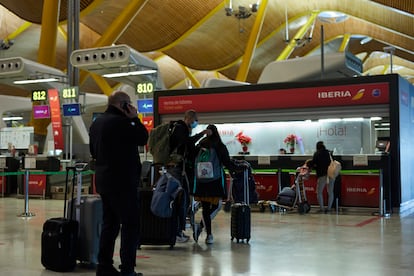Spain changes coronavirus test requirements for air travelers, exempts children under six
As well as a PCR test, arrivals in Spanish airports may present cheaper and faster alternatives such as TMA or LAMP

The Spanish Health Ministry is now accepting several alternatives to the PCR test from air travelers arriving in Spain. After initially demanding a PCR, which is expensive and time-consuming as samples need to be sent to a lab, health authorities are now allowing passengers to show a test known by its initials TMA, as well as other diagnostic tests based on “equivalent molecular techniques” such as LAMP.
Since November 23, a negative PCR test taken within 72 hours of arrival in the country’s airports has been a requirement from so-called “risk countries,” with the threat of a fine of up to €6,000 for those who fail to produce one. The ministry later announced via a press release that children under the age of six will not be required to present any kind of coronavirus test result when arriving in Spain via air.
On December 10, Spain began to accept other kinds of diagnostic tests besides the PCR: according to the Health Ministry website, authorities are accepting a TMA (Transcription Mediated Amplification) as well as “other tests based on equivalent molecular techniques, such as RT-LAMP (Reverse Transcriptase Loop-Mediated Isothermal Amplification).”
These LAMP tests, which are cheaper and faster than PCR, are available at several British airports. On December 3, the Manchester Airports Group (MAG), which operates London Stansted, Manchester and East Midlands, announced the launch of testing facilities at all three airports offering PCR, LAMP, antigen and antibody tests. London Heathrow is also offering LAMP tests, with results delivered in around 60-80 minutes.
The TMA test has been developed by the multinational Grifols, which is of Spanish origin, and detects the presence of the coronavirus in an individual. Samples are taken in a similar way as a PCR test, via a nasal swab. Also like a PCR test, the process looks for genetic material from the coronavirus, amplifying it and measuring it. The difference in practice is that the results come back in around two hours, instead of four for a PCR test, and a TMA test is usually cheaper – just under €100 compared to above €100. The LAMP test, which takes under 90 minutes, is being offered for around £80 at some British airports.
A TMA test provides results in around two hours and is usually cheaper – just under €100 compared to above €100 for a PCR
These tests have been chosen by the ministry as requirements for entry into Spain given that they directly detect the coronavirus, and as such diagnose an active infection. Antigen tests, which are cheaper and faster, can sometimes pick up past infections, which is why the government has ruled them out for now.
As well as exempting children aged under six from the need to present a negative coronavirus test on arrival in Spain, the ministry has also announced that test results can be presented in French or German, as well as in English and Spanish.
All travelers arriving in Spain are also currently required to complete a so-called “Health Control Form,” full details of which can be found here.
English version by Simon Hunter.
Tu suscripción se está usando en otro dispositivo
¿Quieres añadir otro usuario a tu suscripción?
Si continúas leyendo en este dispositivo, no se podrá leer en el otro.
FlechaTu suscripción se está usando en otro dispositivo y solo puedes acceder a EL PAÍS desde un dispositivo a la vez.
Si quieres compartir tu cuenta, cambia tu suscripción a la modalidad Premium, así podrás añadir otro usuario. Cada uno accederá con su propia cuenta de email, lo que os permitirá personalizar vuestra experiencia en EL PAÍS.
¿Tienes una suscripción de empresa? Accede aquí para contratar más cuentas.
En el caso de no saber quién está usando tu cuenta, te recomendamos cambiar tu contraseña aquí.
Si decides continuar compartiendo tu cuenta, este mensaje se mostrará en tu dispositivo y en el de la otra persona que está usando tu cuenta de forma indefinida, afectando a tu experiencia de lectura. Puedes consultar aquí los términos y condiciones de la suscripción digital.








































